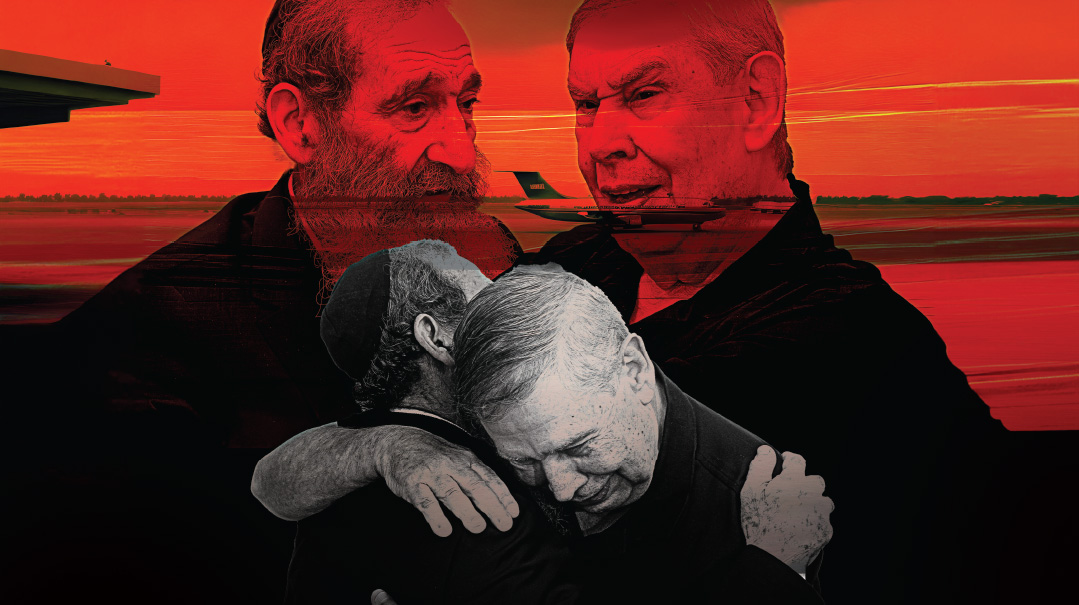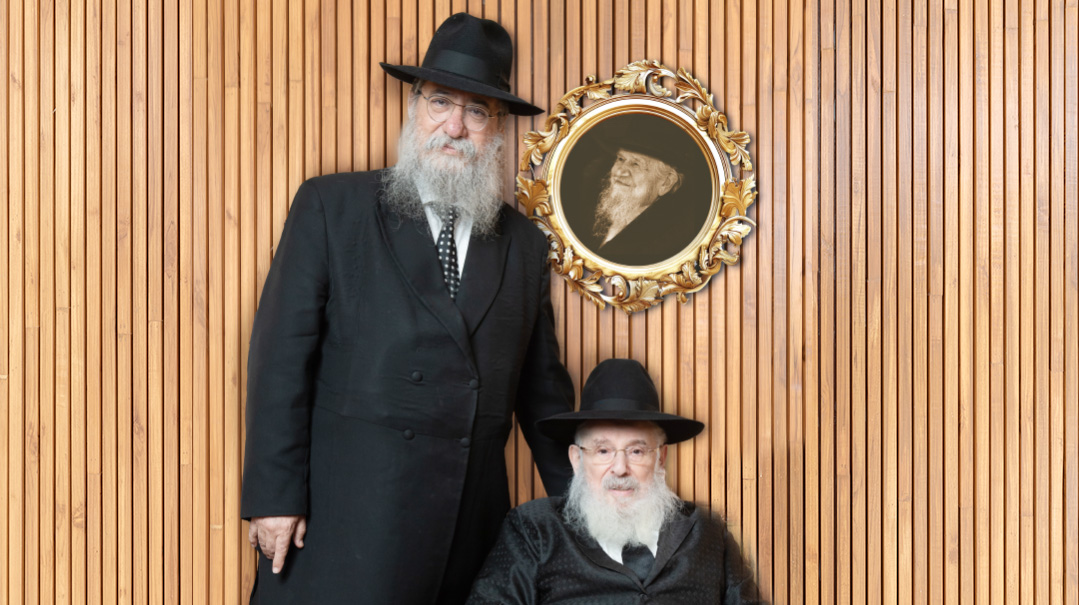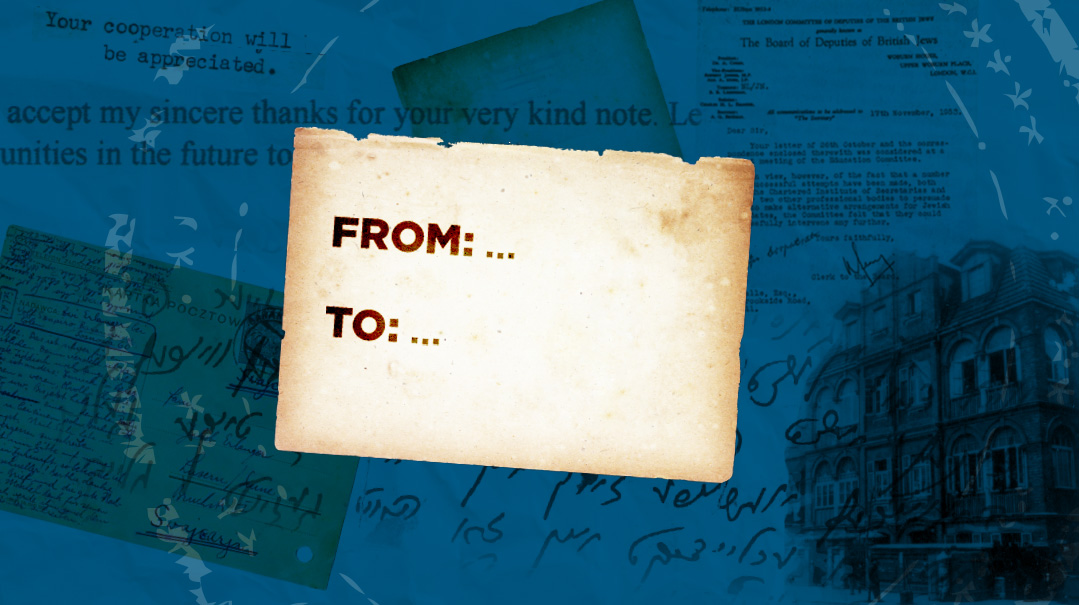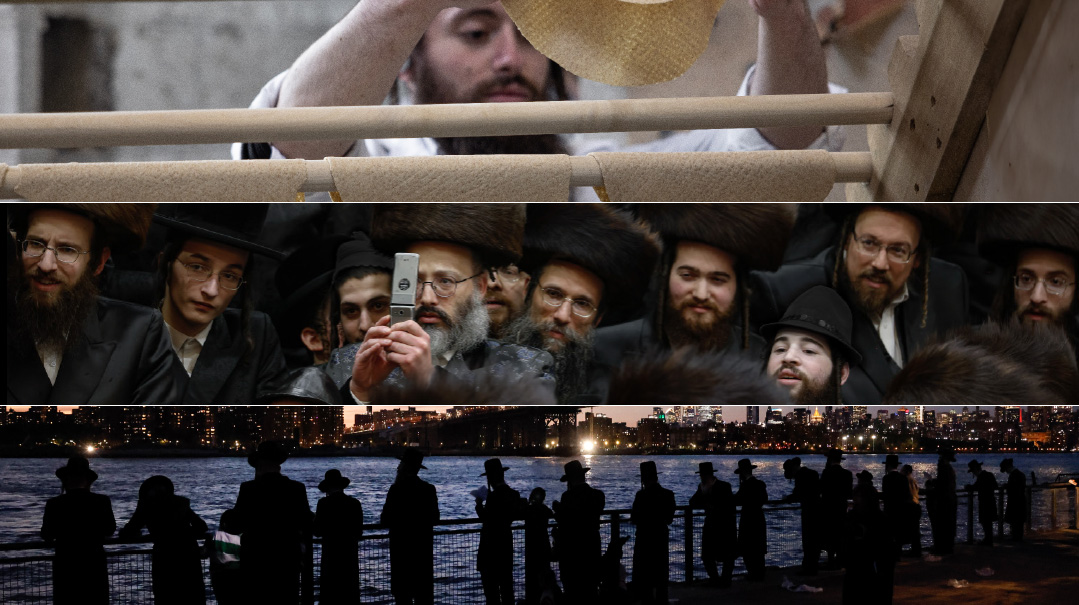With You in Your Pain
| January 2, 2024Visiting the Israeli home front, these New Jersey Jews got more than they gave
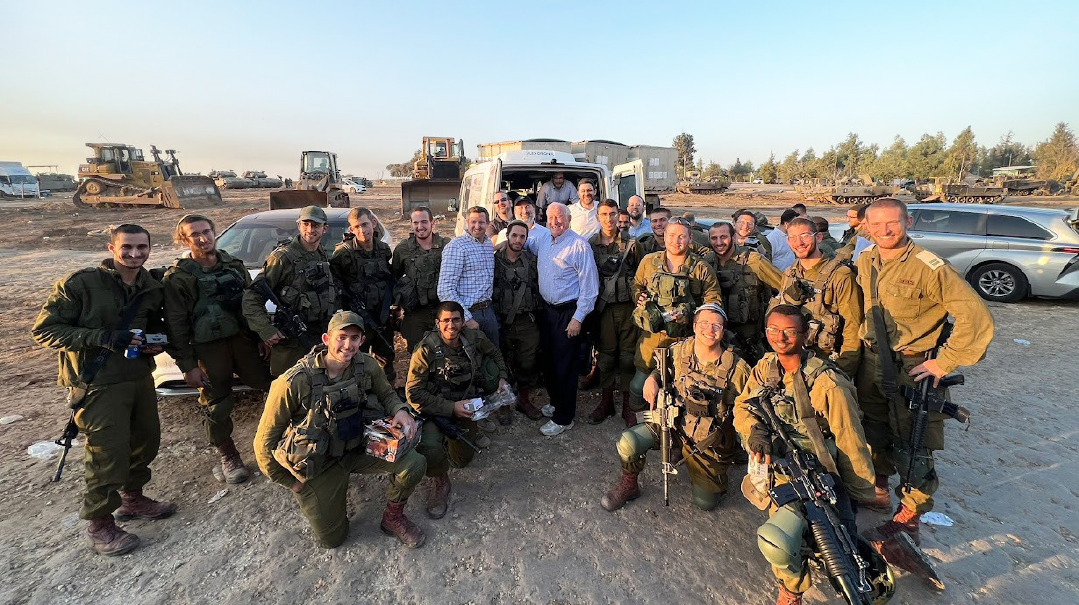
Photos: Chazak Yemin Yisrael Mission
When a group of professionals from New Jersey decided to take a week out of their pressured, busy lives to give chizuk (and badly needed material support) to soldiers, hostage families, displaced people, and grieving parents, they knew the scenes they’d see and the stories they’d hear would be wrenching — but in the end, they received a lot more than they bargained for
Where We’re Needed
Rabbi Yosef Tzvi Rimon, who serves as rabbi of the Gush Etzion Regional Council, has been going from army base to army base every day since the October 7 war started, to make sure soldiers have their spiritual support as well as basic material supplies. While on his rounds, he found that those on base and on the front — many of them sleeping under the sky — were short on winter accessories, especially as the weather was getting colder.
And that was prescient for a group of community members from Clifton and Passaic, New Jersey, who were organizing their own solidarity trip to Eretz Yisrael on behalf of their local tzedakah organization, Chazak Yemin Yisrael. The group of seven — lawyers, accountants, and business owners — pressed pause on their professions for almost a week to carry out a five-pronged mission: to give chizuk to hostage families, to visit grieving families, to give financial support to displaced families, to visit injured soldiers, and even to roll up their sleeves and work the abandoned fields.
Yet after days of giving and giving, they insist that they got much more in return.
Between the group’s connection to Rabbi Rimon and to General Benzi Gruber — vice commander of the 252nd armored division with over 30,000 soldiers under his command — the volunteers compiled a list of items the soldiers needed and started filling duffle bags. They also got many boxes of clothing from Yad Leah in Clifton, which sends $5 million worth of clothing annually to 25 communities throughout Eretz Yisrael, expediting their standard delivery of warm clothing.
And so, with a wad of freshly raised funds, 17 70-lb duffel bags, and a pile of Yad Leah boxes, the group headed for the El Al counter at the airport. (El Al was charging a discounted $50 per suitcase for Israel aid, instead of the regular $150.)
No Exchanges
Visiting Kiryat Arba Mayor Eliyahu Libman, whose son Elyakim was taken captive on October 7, was a lesson in emunah and bitachon. Sitting in his office, a bookcase of seforim on one side and an M-16 on the other, Libman — a voice of strength for other hostage families who grew up in Chevron where hard-core faith was a constant companion — says he is surviving the ordeal through emunah and by focusing on the positive, while at the same time juggling the day-to-day needs of his constituents.
“We are called Yehudim, from the word lehodot, to thank,” he said. Yet his own hopeful demeanor doesn’t change the sad repeat of history. His brother, Shlomo Libman, was murdered in 1998 while on a jeep patrol around the perimeter of Yitzhar, and the killer was later released in the Shalit deal in which over a thousand terrorists were freed. Libman is adamant that his son not be released in a similar exchange, at the expense of the safety of the country’s eight million citizens, and is the voice of the few hostage families not advocating for another such deal.
Meanwhile, another two Libman sons are in combat in Gaza, their tanks rumbling over the very tunnels in which their brother is possibly being held. The brothers in action have been spraying graffiti on walls around Gaza with messages to their brother, “We’re on our way,” and “Mom is waiting for you at home.”
Heroes in Both Worlds
Unfortunately, there are new shivah houses every day, and most of them are packed with visitors. But families appreciate comfort long after the crowds leave. And so, the group was directed to Rabbi Yehoshua Shani, the father of 22-year-old Ori Shani Hy’’d of Kiryat Arba, husband and father of a four-month old baby, a Golani commander murdered on October 7 while fending off terrorists at the entrance to the Kissufim base. Before he was gunned down, he managed to kill 35 terrorists and secured the installation.
Not only did Rabbi Shani want to talk about Ori weeks after his murder, he prepared an elaborate slide show about his son’s life — the unit he served in, news clips that had circulated of him — and he took much comfort in talking about him. In fact, a list of 13 resolutions that was publicized as suggestions for people to take on as a zechus for Klal Yisrael came straight off a list found in Uri’s Rosh Hashanah machzor.
Later, at the home of fallen soldier Eitan Dov Rosenzweig Hy’’d in Alon Shvut, Eitan’s mother sat with the group and told them about her son’s life, from the moment he was born to, literally, the moment he died — or whatever she knew of it. He was killed by a grenade. His comrades pulled him back and tried to save him, but were unsuccessful. His mother told how, when she asked her son what he might want while out in the field, he asked not for comforts like food or warm clothing but for his pocket seforim.
Far Away from Home
At a hotel housing the displaced residents of Moshav Shokeda, the group heard firsthand the mind-blowing miracle of how Shabbos saved them from certain slaughter, the fate of their neighboring communities.
This moshav is next to Kibbutz Be’eri, with only a forest separating them. On that fateful Simchas Torah morning, an IDF helicopter was hit by Hamas fire and forced to land in the intersection in front of Kibbutz Shokeda. Dozens of terrorists were headed for Shokeda but when they saw the stationary helicopter, they were engaged in battle there with the emerging IDF soldiers and were killed, never making it past the locked gates of the Shabbos-observant moshav. The moshav had a double miracle, as terror convoys simply drove right past it on the main road, not bothering to take a short right and enter. That was a double blessing, because, as was with other communities, many of the large weapons had been confiscated the month before, and a few hand pistols were certainly not enough to fend off a highly-armed terrorist mob.
The hotel looked a bit like a Pesach program that never ended — nice for eight days but not for months. Currently they’ve been given a move-back date of February, but that keeps getting postponed. In any case, most of the local facilities are still closed.
Nevertheless, there’s a happy atmosphere. The children are playing, the women are chatting. One of them is Chana Alloro, a comedienne who performs for Jewish women’s events. She shared that designers from around the country have sent them dresses, head coverings, jewelry, and shoes, a welcome treat from the basic garments they fled their homes in.
The group also took part in a joyous bar mitzvah in the hotel, completely arranged by the Telz Stone community.
The children, who received a stash of toys from the group, are temporarily learning in the nearby Telz Stone schools but their day finishes just after noon, which is too short. In order to boost their learning, the mothers — who are mostly single-handed now, with so many husbands having been called up — arranged a night learning program of daf yomi, incentivizing the boys with a grand siyum when they finish the masechta. Finding sponsors for the siyum is one of the things the Passaic group put on their follow-up list.
Embraced
The group’s plan was to proceed to Kibbutz Be’eri, but that day it was off-limits as the prime minister and president were visiting there. Instead, the group diverted to the IDF staging area just outside of Be’eri, the army’s entry point into Gaza. The group parked their very civilian SUV near rows of tanks and armored vehicles and pulled open their loaded trunk for the soldiers’ taking: leather gloves, tactical knives, headlamps, protein bars, thermal clothing, laser pointers, and more.
Some 50 soldiers crammed around, picking the essentials. Oh, and wristwatches. Without their phones, how do soldiers tell the time, which is of essence during war?
As the vehicle was being emptied and warm embraces were shared, a tank rolled by on its way into Gaza. Seeing the commotion, a tank soldier popped his head out of the commander’s hatch shouting over the din what we were there for. One of the group called back, “‘We just came to tell you we love you and to thank you for everything you’re doing.” Touched to the core, he exited the tank with another soldier and was enveloped in a kiddush Hashem embrace, adding, “You and we are brothers,” before rolling on into the lion’s den.
While at the staging area, there was a representative from Tzalash, an organization that goes to different bases to give chizuk to frum soldiers. He was handing out a Minchas Asher, a specially-printed compact version full of commentary on Chumash Bereishis by Rav Asher Weiss, a highly respected posek and rosh yeshivah, and the personal rav of many hesder students.
Someone in the group who is close to Rav Weiss called the Rav and asked him to give the soldiers divrei brachah on their way into Gaza. “I’m so proud of you fighting for Am Yisrael,” he declared, “and davening that you should win and come home safely.” Thirty-five boys huddled around the phone, hanging onto every word like it was their armor.
Hoping to Heal
At Sheba Medical Center, the geriatric ward was repurposed to house wounded soldiers — the forgotten heroes of this war. There are no scratches here. These soldiers have life-altering injuries. Many of them had their legs covered in blankets. Yet when the “America’im” knocked politely on the doors, asking, “Selichah, efshar levaker?” they received an enthusiastic response. One of them swung his immobile legs to the side of the bed, propped by tall axillary crutches, to escort his visitors to the patio for a game of backgammon, even though one of the visitors warned him that no one beats him. True to the visitor’s word, the patient lost — but he gained the knowledge that, no matter what is or isn’t on his head, his religious brothers are rooting for him.
Another patient was a newlywed who’d gone to battle two weeks after his wedding. His wife was by his side. Remarkably, he — and so many other soldiers who’ve retained their mobility — expressed a genuine desire to get back into the field, urging the nurses to speed up their recovery.
The group handed out lots of cards, sincerely written by schoolchildren from several schools back in Passaic. Petty though a childish note might seem, patients were sincerely touched by the thoughtful gesture — many even hanging up the cards and letters on the walls above their beds.
Lending a Hand
Moshav Naveh, near the Gaza-Egyptian border, self-evacuated after October 7, but they’re happy for anyone who can make the trip down south to lend a green hand. After the group had traveled about two hours out of Jerusalem, the two-lane highway merged into a single lane, and then to a deserted dirt road. They checked the map, which showed they were heading toward the little corner where Israel, Egypt and Gaza meet. To add more angst, they arrived at a sign reading “Border Crossing.” And then, looking ahead in the not-too-far distance, they could glimpse rows of containers — which meant they were heading toward the Rafah crossing, where aid trucks were going through.
Driving down this dirt road toward the border doesn’t feel too safe in quieter times, so they made a U-turn and approached Moshav Naveh the long way around, where they helped empty the fields of ripe scallions, as requested. While this moshav was unharmed, all their Thai workers were immediately called back by their government, leaving the farm without staff overnight.
Another shorthanded farming settlement the group visited was Kibbutz Alumim, which had its own Shabbos miracle — not one kibbutz casualty, although 16 Thai workers were slaughtered and another four taken captive. The head of security there explained that each Hamas team had a different mission. The primary goal of the team that attacked the kibbutz was to cripple the agricultural industry (a majority of the country’s vegetables are grown in this part of the country), and the thousands of local farm hands, mostly workers from Thailand, have been too scared to return. The terrorists entered Alumim from the fields in the back (the main front gate of the Shabbos-observant kibbutz was locked) and went straight for the workers’ living quarters, leaving such bloodshed in their wake that the group wasn’t given entry there, as the evidence of the massacre is still present.
Without Weapons
One of the group members had been in Eretz Yisrael for Succos, and before his initial return to the States, he dropped in to the Dan Panorama Hotel where displaced residents were housed, to see what help he could offer. The displaced residents of Moshav Yachini told him they felt their kids missed out on Simchas Torah, and could he help them make a “Simchas Torah Sheni”? That night, the whole neighborhood came with music, dancing, and candy, and gave them a slice of what they missed.
From that post-Succos connection, the group set up a visit at Moshav Yachini, a Yemenite community located between Netivot and the northern Gaza Strip, where a security team told them about their moshav’s wrenching but miraculous saga. The Israeli government had recently decided it wasn’t safe for moshav residents to keep automatic weapons in their homes, so they ordered all residents to store their weapons in a central armory, to which only the head of security would have access in times of emergency. Given all the intelligence the Hamas had gathered, they knew this policy and therefore went after each yishuv’s head of security as their first target — thereby giving them access to the armories.
Moshav Yachini had an Arab worker who lived on the kibbutz during the week and went home for the weekend. He knew everything about everyone, down to the fact that one resident kept his car keys in his car and that the code to start the car was disabled. When the terrorists arrived at this shomer Shabbos moshav, the gate was locked, so the terrorists stormed through the pedestrian gate single file, their first destination this unlocked car. (The locked gate meant they couldn’t get in with their trucks and overwhelm the moshav with dozens of terrorist.) They were engaged by the town’s emergency squad where a gun battle ensued (handguns versus Kalashnikovs), but some managed to break through, and once inside the car they were looking for, they sped toward the head of security’s home, got out, and shot the first man they encountered. Tragically, this was the head of security’s nephew; the head of security, Ariel Zahavi, was in Thailand at the time (he created a situation room in the local Chabad House until he could get a flight back).
Yet further tragedy was curbed by another miracle. Soldiers had come to respond to the Kibbutz Be’eri massacre nearby, but stopped by Moshav Yachini to change into their gear — two snipers among them. The snipers spotted the terrorists in action and eliminated them all, but alas, the terrorists had managed to kill seven residents. There were still bloodstains on the sidewalk by the group’s visit….
Tapping into Tefillin
The group then drove to meet General Benzi Gruber in order to deliver boxes and duffel bags of essentials and warm clothing, plus pairs of tefillin that were requested by soldiers, some of whom hadn’t donned tefillin since their bar mitzvah, if at all.
At the Be’er Sheva base, the group met members of the Engineering Corps, whose job is to go in once terrorist buildings are identified and blow them up. That’s why they were very appreciative of all the multi gear and warm clothing we brought them. They schmoozed, sang, danced, and distributed tzitzis.
Piece of Paradise
Netiv Ha’asara is the closest yishuv to the Gaza Strip on its northern border. Its high location made it difficult for terrorists to access by car, so they infiltrated using paragliders, wreaking devastation and killing at least 20 residents in this sleepy town described as “a little piece of paradise.”
Wartime Questions
The group visited Rav Asher Weiss in his Jerusalem home, where they heard about chilling sh’eilos that don’t usually arise. “I’m fighting in Gaza. May I drive to my son’s bris which will be held on Shabbos?” “After years of fertility treatment, I discovered that I finally have good news. Can I share it with my husband, a reservist, if it might make him too nervous to fight properly?” So many questions, so many halachic concerns that demonstrated the beauty and gadlus of Am Yisrael. Rav Weiss said he was astounded that people from so many sectors were asking such intricate questions — a true kiddush Hashem.
Death and Life
The group’s final destination was the Shura army base. Today in Israel, say “Shura” and everyone nods solemnly. This is where victims’ bodies are brought for identification, carried out by teams of experts in the halachos of kevod hameis, where rabbanim have to make wrenching calculations, such as if the discovery of a bone fragment is enough proof of a person’s death, in order to free his wife from the status of agunah.
But the base has another function as well — to inspire soldiers at war. The base has an entire warehouse lined with shelves of sifrei Torah — the world’s biggest aron kodesh — that are either pasul and waiting to be repaired, or allocated to different bases around the country. And there are portable bookcases complete filled with Chumashim, siddurim and more, meant for the soldiers’ treks. Several of these mini “seforim shranks” have found their way into buildings in Gaza where the IDF has hunkered down. The Shura base also has a department dubbed “Copywriting,” where military rabbis write pamphlets of divrei Torah and create content videos to inspire and uplift. (There’s also an occasional humor clip called “15 Things a Bored Officer Can Do on Guard Duty.”)
We’ve been inundated for the longest time about the polarization in Israeli society, but the group learned something totally different. It didn’t matter what type of Jew they met: They were all brothers — every soldier, patient, and displaced person. And isn’t that a lesson we should all take away, even without getting on a plane?
(Originally featured in Mishpacha, Issue 993)
Oops! We could not locate your form.

